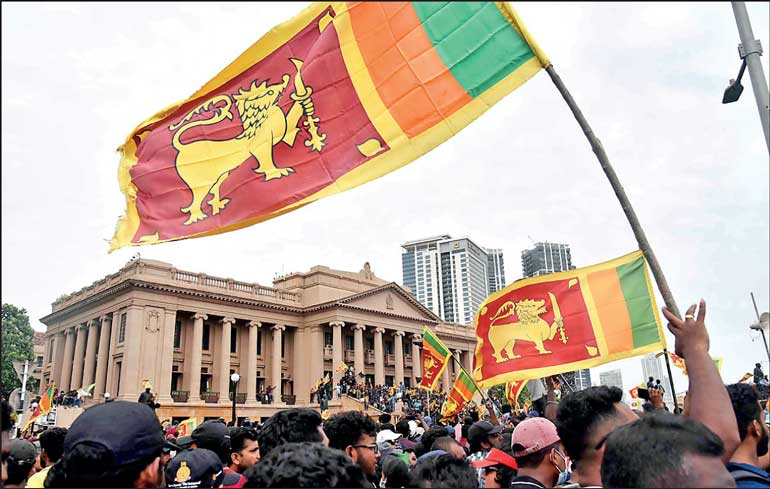Wednesday Feb 18, 2026
Wednesday Feb 18, 2026
Wednesday, 3 August 2022 00:15 - - {{hitsCtrl.values.hits}}

 In the criminal justice system, the norm is that “a crime never dies”. The English legal maxim ‘nullum tempus occurrit regi’ (no time runs against the king) is a reflection of this concept. In other words, lapse of time is no bar to Crown in proceeding against offenders. A Civil action, on the contrary, is bound by a prescriptive period after which no claims can be made except under exceptional circumstances, in certain instances. This is governed by the Roman law maxim, ‘vigilantibus et non dormientibus jura subveniunt’, which means, law shall only assist those who are vigilant and not those who sleep over their rights.
In the criminal justice system, the norm is that “a crime never dies”. The English legal maxim ‘nullum tempus occurrit regi’ (no time runs against the king) is a reflection of this concept. In other words, lapse of time is no bar to Crown in proceeding against offenders. A Civil action, on the contrary, is bound by a prescriptive period after which no claims can be made except under exceptional circumstances, in certain instances. This is governed by the Roman law maxim, ‘vigilantibus et non dormientibus jura subveniunt’, which means, law shall only assist those who are vigilant and not those who sleep over their rights.
“Political violence is not political in the eyes of everyone. For some it is distinctively criminal while others attribute to the act a political dimension,” says political researcher Prof. Paul Du Mouchel. “They recognise that it has some legitimacy. … Some individuals feel some sympathy for those who committed the violence, and may favour partial political amnesty for the perpetrators … Others for their part are ready to join them. An act of violence is political to the extent that it is legitimate.” (Political Violence and Democracy).
Nature of violence
Violence broadly is of three types. Firstly, personal, with a cause or motive say domestic violence, thuggery in the petrol queue or killing someone over a private dispute. These are condemned by society. The second form is not personal but for the public benefit like popular uprising or due to public revulsion for instance, physically harming a serial rapist who kills his victims. This type, which will be explained later, receives public legitimacy though in law it is a criminal act. Such violence is not condemned but condoned by the people. The third type is State violence like Police torture or brutality.
Sri Lanka has its own penal laws concerning criminal offenses and their punishments. Any violation of it will attract the punishment prescribed for that crime. Generally, the essential ingredients for a criminal prosecution are intention (mens rea) and action in furtherance of that intention (actus reus) on the part of the person or persons committing the offence. It may be added that there is some tangible or intangible gain for the perpetrator which makes him act in that manner. Simply put, if he stole property, he has a monetary satisfaction or if he had assaulted someone, then he has fulfilled the reason (anger or revenge), for such assault. However, they constitute penal offences. Both the agents and the actions will be frowned upon by society. The society will neither recognise nor accord any legitimacy whatsoever for such conduct.
Political violence
In the case of political violence technically, the penal laws remain the same. Violence is not primarily intended but the potential remains in a struggle challenging the establishment. We have seen many public protests against tyrannical rulers, corrupt governments, dictatorships like the Arab Spring. Empirical observation indicates how political violence differs from ordinary criminal violence.
Firstly, there is no tangible or intangible personal gain for the individual. Secondly, the struggle is for the common good of all the people or the country. Thirdly, these actions originate not by one individual; not two; not a group but, a whole consensual mass of people. The participants may not even know each other. Fourthly, the action though illegal is not condemned by the society. In fact, society heralds such actions and the perpetrating agents as heroic, courageous and brave. Fifthly, there is an unwritten, implicit common understanding between the actors. Finally, because of these qualitative elements, the society gives its approval of legitimacy and tacit amnesty for the unlawful actors.
Contextually, the widespread protest that led to the ouster of former President Gotabaya Rajapaksa on 9 July is a recent incident. The people literally recognised, accepted and legitimised the uprising and the ouster. The vast majority welcomed and hailed the trespass into the President’s house. The people were jubilant. They thronged in their thousands to explore the President’s house although that, too, was criminal trespass. The difference was that such violation was sanctioned by society and thereby receiving legitimacy. The greater benefit for the people and country as a whole, far outweighed the attendant sporadic violence. For the people, the illegality was negligible and unworthy of any consideration.
This is how a government formed after a bloody revolution against a tyrannical ruler becomes a legal entity because it has the acceptance of the people. So, what was illegal has gained legal status by virtue of the society granting it the seal or approval of legitimacy. The reason for society to give legitimacy is because these agents have done what the society wanted.
State violence
The State also engages in violence which in ‘law’ is considered legitimate. For instance, police shooting of suspects in custody for various reasons during search or discovery operations, disappearances of persons, torture and intimidation. These are illegal use of a legitimate power in a clandestine manner. One may argue that politics has a direct or indirect role to play in State violence with the involvement of the State apparatus. A subservient police force backed by corrupt politicians make an effective combination for State perpetrated violence.
We recently heard from media that some suspects who had stolen brass balls from the window curtains of the President’s House had been arrested. This, no doubt, is clear theft and needs to be dealt with as per the law. However, is it not disgusting, unacceptable and deplorable that the State’s law enforcement aided and abetted the President to run out of the country after he had destroyed the lives of 22 million people? The foremost consideration for a government is to protect and ensure the security of all citizens equally with regard to rights to “life, liberty, and the pursuit of happiness; not to protect and promote the interest of a single person or a family or members of its party.
In the case of the Aragalaya, a large number of outspoken fellows amongst the crowd or outstanding figures of the campaign are now being hounded and arrested and charged for obstruction of Police duties, destroying public property, etc. In the context explained above, the use of State machinery to extract vengeance or to settle scores under the pretext of law becomes highly questionable. It will carry the label of abuse and misuse of authority dismissing the sensitivities of the commoner. In simple terms, this tantamount to State violence and repression.
Right of revolution
At present, we know the country is bankrupt. There is a total breakdown – no food for the people, no cooking gas, no fuel for transport, no medicines, no schools for students, no electricity, manufacturers and industrialists are closing down, people losing jobs, inflation above 50% while salaries remain the same, transport cost increased, rampant corruption, horse-trading by the politicians, abuse of authority by the police, bureaucrats and the list goes on.
Political philosophy is of the view that where the government persistently fails to deliver, it is the right and the duty of the people to change their government. Therefore, it is sad that this right is not enshrined in the constitution however, it is a natural law right. Legally speaking, this gang of politicians are well within the borders of the constitution. The people have two options. First, to remain silent, continue to suffer and die. Second, to rise up against the corrupt rulers.
The Aragalaya is the result of the second option. Their protests chased the President and the Prime Minister from their Offices. Though the protests were violent sometimes, such violence had the acceptance and recognition of the society. The people justified and legitimised it. Then such actions and the agents of such actions cannot be considered as acting against the penal laws. The circumstances are different. The primary considerations have changed. The situation is novel and unique.
The American Declaration of Independence, borrowing the reasoning of John Locke, succinctly states the American doctrine of the right of revolution:
“But, when a long train of abuses and usurpations, pursuing invariably the same object, evinces a design to reduce them under absolute despotism, it is their right, it is their duty, to throw off such government, and to provide new guards for their future security”.
Alexander Hamilton, acknowledged that no constitution can guarantee that a widespread revolutionary opposition to the government will never occur; such opposition might well proceed “from weighty causes of discontent given by the government” itself. (The Federalist #16).
View of the Supreme Court
In the Indian case of Sheonandan Paswan vs State Of Bihar & Others, the Supreme Court said that in case of a conflict between the two types of public interests, the narrower public interest should yield to the broader public interest, and, therefore, an onerous duty is cast upon the court to weigh and decide which public interest should prevail in each case while granting or refusing to grant its consent to the withdrawal from the prosecution.
Per Tulzapurkar J (Concurring with Baharul Islam and Misra JJ.) said: “But the decisions do lay down that when common law crimes are motivated by political ambitions or considerations or they are committed during or are followed by mass agitations, communal frenzies, … student unrest or like situations involving emotive issues giving rise to an atmosphere surcharged with violence, the broader cause of public justice, public order and peace may outweigh the public interest of administering criminal justice … and persistence in the prosecution in the name of vindicating the law may prove counter-productive.” (1983 AIR 194, 1983 SCR (2) 61 Supreme Court of India) (Emphasis mine).
The persuasive value of this Supreme Court judgment must be heeded by the Government. Prosecution to vindicate the law will be counter-productive. Justice to the public outweighs administering criminal justice.
(The writer holds an LL. B (Hons) UK, and is an Attorney at Law (Ex-Advisor to former Presidential Private Department of UAE). He can be reached via email at: [email protected].)